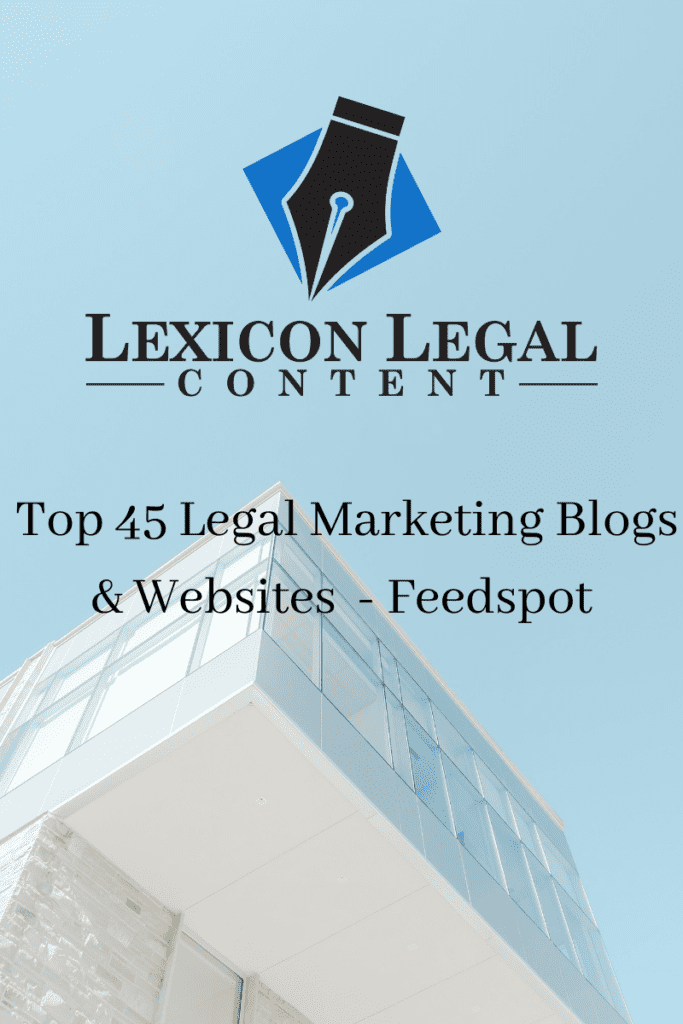It’s estimated that over 2,000 honors or recognitions specifically target the legal profession in the United States. The number of awards given by bar associations, law schools, and media outlets has swelled tremendously during the past two decades. The law firms and attorneys receiving them can leverage them to their advantage by blogging about them.
Legal awards and recognitions are third-party validation of an individual attorney, practice or law firm’s credentials. No legal client is likely to hire a lawyer simply because of an award they received. However, it may get them on a prospective client’s radar or shortlist.
Simply put, legal awards and honors help enhance attorney and law firm profiles law firms, and differentiate them from the competition.
One way to get your audience and prospective clients to learn about the accolades you have receive is to start writing blogs announcing when you receive them.
Awards Set You Apart from Other Attorneys
Legal marketing isn’t easy, especially considering the many ethical and legal compliance constraints you must adhere to. You must be keenly aware of how you talk about your services, skills, and track record.
At the same time, many prospective legal clients don’t know how to tell one lawyer apart from the next and generally assume that they are all about the same. So how can you set yourself apart from the competition and still stay within your ethical and legal bounds?
There are many ways, but one of the easiest and most obvious is to include your award nominations and recognitions in your marketing efforts. This includes publishing blogs about the honors you receive.
Awards for attorneys aren’t typically handed out like participation trophies to the elementary soccer team. These awards, honors, and recognitions set you apart from the competition.
When you leverage them in an appropriate way, you can do so without seeming like you are bragging or at the risk of crossing any ethical boundaries.
Awards and New Attorneys
You can certainly benefit from writing a blog about a recognition or award if you are a newer attorney. When you first start out, you may not have much experience or many skills that differentiate you from your local peers. Receiving awards and recognitions might be the first thing that distinguishes you from someone else and ends up bringing you more clients.
Publishing a blog post about your award not only helps you with SEO but also establishes your authority locally within your legal niche and target audience, drawing more potential clients to your law firm’s website and increasing your numbers.
Highly Decorated and Experienced Attorneys
Attorneys who have been in practice for quite some time may have received multiple awards; some may be the same award year after year. While they might seem redundant, don’t discount these awards.
Having numerous awards or receiving the same recognition for many years in a row not only shows that a lawyer was experienced and successful then but remains that way now. Some potential clients will be more likely to hire an attorney with more recent awards and recognitions than someone who won them years ago but not since.
Tips for Writing an Award Blog Post
Follow the Award Advertising Guidelines
Professional organizations that award recognitions in the legal industry frequently have their own guidelines for announcing and promoting these awards.
When you publish a blog post about or publicize an award on your website or elsewhere, always be sure you comply with their guidelines. If you don’t, you could be penalized by the organization and prohibited from further promoting the award in the future.
For instance, Martindale-Hubbell requires that any rating internet advertisement includes the text below and either a specific explanation of the rating or a link to the Martindale-Hubbell explanation:
“AV®, AV Preeminent®, Martindale-Hubbell DistinguishedSM, and Martindale-Hubbell NotableSM are Certification Marks used under license in accordance with the Martindale-Hubbell® certification procedures, standards, and policies.”
Some organizations require you to place a trademark symbol by their name or the award or otherwise refer to the award in specific terms.
Furthermore, some companies let you know you have won the award months ahead of the announcement and require you not to release the information until they make their formal announcement. Martindale-Hubbell, Super Lawyers, and Best Lawyers all publish their guidelines online.
Include All Recognitions Awarded to Lawyers in Your Law Firm
If you work for a law firm and multiple lawyers at your law firm receive the same or similar recognition at the same time, be sure you write one blog to include all of the awards received by the lawyers at your firm and the law firm itself. You can list each attorney and what they were recognized for and provide a short bio about them.
Comply with Your State’s Ethics Requirements
Attorney advertising falls under state bar regulations, including legal ethics rules. Attorneys or law firms who violate rules of professional conduct may face penalties such as fines, public censure, or even disbarment. In these cases, the attorney, not their marketing department, will be held responsible for what is published online.
Before publishing a blog post about your recognition or award, review the specifics of the professional conduct rules in every state where you practice and are licensed to ensure compliance.
For example, most states prohibit any statement that isn’t objectively verifiable, such as “Tom Smith is the Best Lawyer in the Pacific Northwest.” However, “Tom Smith has been recognized by Best Lawyers®,” is permissible. If an award recognizes an attorney’s work for a specific year, geographic location, or legal practice area, be sure to include that in the blog post or other announcement.
Keep in mind that some states have precise requirements. For instance, the Supreme Court of New Jersey recently enacted a provision that lawyer and law firm awards, honors, and accolades may only be referenced when they can be verified and the awarding organization has made sufficient inquiry into the qualifications of the individual attorney or law firm.
New Jersey also requires the following to accompany any reference to the award:
- The name of the award-issuing organization
- A description of how award recipients are selected, in the blog post itself or by referencing an easily-accessible public source
- The disclaimer: “No aspect of this advertisement has been approved by the Supreme Court of New Jersey.”
Remember, it’s your responsibility to check your state’s legal conduct rules.
Don’t Forget Local or Regional Awards
Just because your award or recognition didn’t come from Avvo, Super Lawyers, or Best Lawyers doesn’t mean you shouldn’t share it with potential clients and your target audience. In fact, it may be more significant to those local to you.
For example, in the Denver metro area, 5280 Magazine publishes a list of Top Lawyers annually every January. While people looking for a lawyer in the area may have never heard of Super Lawyers or Best Lawyers, many have heard of or even regularly read 5280 Magazine. Lawyers with an award from this magazine will stand out to locals, whereas lawyers with other awards may not so much.
Stay Away from Paid Recognitions
There are many awards and recognitions out there. To protect your integrity and remain ethical, it only makes sense to stay away from paid recognitions.
You want to be able to say that your award was earned and well-deserved; paying for one can undermine your credibility and authority to your audience and legal community. Some of them may even be scams. The only thing these honors are recognizing is your ability to pay, not your actual skills or expertise.
Although some may offer paid advertisements in their publications, real awards honor outstanding attorneys without caring whether they pay. Instead, focus your efforts on your clients, which will, in turn, likely put you in the running for reputable recognition.
Don’t Just Post Award Announcements
Effective legal blog writing, just like all other marketing efforts, requires ongoing action. You can’t just write a blog post each time you have an award or recognition to announce for your practice or firm. Not only could it come across as tacky to your prospective clients, but it also doesn’t help your SEO.
Writing and publishing a legal blog at least once or twice weekly to drive traffic to your site and generate interest. Blogging about your awards should only be a small portion of your blogs. Instead, focus on blogging about helpful and valuable content for your readers when you don’t have awards to announce.
Remember, you wouldn’t be an award-winning attorney if you didn’t have valuable information to share. Periodic sharing of awards won’t attract the interest of real people or online algorithms. You need to regularly publish a blog post for effective SEO.
Don’t be afraid to share your awards and accolades with your readers via your legal blog and even your firm’s newsletter, if you have one. Incorporate these tips, good SEO, and it will only be a matter of time until you start to reap the benefits.
Do You Need Help with Blog Writing? Turn to the Blogging Experts at Lexicon Legal Content
If you need assistance writing your award announcements and other legal blogging or don’t have the time to do it yourself, the attorney-led team at Lexicon Legal Content can help. Contact us today to learn more about our customized blogging and legal content services.





